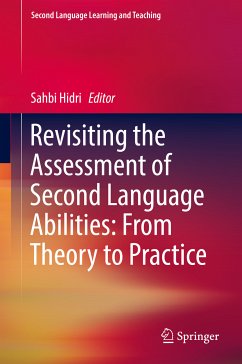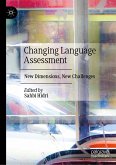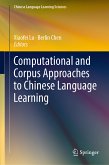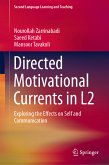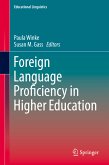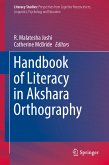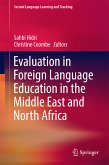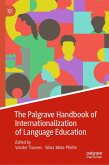Revisiting the Assessment of Second Language Abilities: From Theory to Practice (eBook, PDF)
Redaktion: Hidri, Sahbi
120,95 €
120,95 €
inkl. MwSt.
Sofort per Download lieferbar

60 °P sammeln
120,95 €
Als Download kaufen

120,95 €
inkl. MwSt.
Sofort per Download lieferbar

60 °P sammeln
Jetzt verschenken
Alle Infos zum eBook verschenken
120,95 €
inkl. MwSt.
Sofort per Download lieferbar
Alle Infos zum eBook verschenken

60 °P sammeln
Revisiting the Assessment of Second Language Abilities: From Theory to Practice (eBook, PDF)
Redaktion: Hidri, Sahbi
- Format: PDF
- Merkliste
- Auf die Merkliste
- Bewerten Bewerten
- Teilen
- Produkt teilen
- Produkterinnerung
- Produkterinnerung

Bitte loggen Sie sich zunächst in Ihr Kundenkonto ein oder registrieren Sie sich bei
bücher.de, um das eBook-Abo tolino select nutzen zu können.
Hier können Sie sich einloggen
Hier können Sie sich einloggen
Sie sind bereits eingeloggt. Klicken Sie auf 2. tolino select Abo, um fortzufahren.

Bitte loggen Sie sich zunächst in Ihr Kundenkonto ein oder registrieren Sie sich bei bücher.de, um das eBook-Abo tolino select nutzen zu können.
The book is very helpful for teachers, researchers, MA and PhD students, and ELT practitioners The book suggests hands-on practice on how to measure the construct statistically The book examines educational cases from different parts of the world in an extensively critical way The book comprehensively summarizes the recent studies and reviews of the literature on assessing the constructs of language abilities as well as test fairness and validation
- Geräte: PC
- ohne Kopierschutz
- eBook Hilfe
- Größe: 7.06MB
Andere Kunden interessierten sich auch für
![Changing Language Assessment (eBook, PDF) Changing Language Assessment (eBook, PDF)]() Changing Language Assessment (eBook, PDF)72,95 €
Changing Language Assessment (eBook, PDF)72,95 €![Computational and Corpus Approaches to Chinese Language Learning (eBook, PDF) Computational and Corpus Approaches to Chinese Language Learning (eBook, PDF)]() Computational and Corpus Approaches to Chinese Language Learning (eBook, PDF)72,95 €
Computational and Corpus Approaches to Chinese Language Learning (eBook, PDF)72,95 €![Directed Motivational Currents in L2 (eBook, PDF) Directed Motivational Currents in L2 (eBook, PDF)]() Nourollah ZarrinabadiDirected Motivational Currents in L2 (eBook, PDF)40,95 €
Nourollah ZarrinabadiDirected Motivational Currents in L2 (eBook, PDF)40,95 €![Foreign Language Proficiency in Higher Education (eBook, PDF) Foreign Language Proficiency in Higher Education (eBook, PDF)]() Foreign Language Proficiency in Higher Education (eBook, PDF)128,95 €
Foreign Language Proficiency in Higher Education (eBook, PDF)128,95 €![Handbook of Literacy in Akshara Orthography (eBook, PDF) Handbook of Literacy in Akshara Orthography (eBook, PDF)]() Handbook of Literacy in Akshara Orthography (eBook, PDF)72,95 €
Handbook of Literacy in Akshara Orthography (eBook, PDF)72,95 €![Evaluation in Foreign Language Education in the Middle East and North Africa (eBook, PDF) Evaluation in Foreign Language Education in the Middle East and North Africa (eBook, PDF)]() Evaluation in Foreign Language Education in the Middle East and North Africa (eBook, PDF)72,95 €
Evaluation in Foreign Language Education in the Middle East and North Africa (eBook, PDF)72,95 €![The Palgrave Handbook of Internationalization of Language Education (eBook, PDF) The Palgrave Handbook of Internationalization of Language Education (eBook, PDF)]() The Palgrave Handbook of Internationalization of Language Education (eBook, PDF)183,95 €
The Palgrave Handbook of Internationalization of Language Education (eBook, PDF)183,95 €-
-
-
The book is very helpful for teachers, researchers, MA and PhD students, and ELT practitioners
The book suggests hands-on practice on how to measure the construct statistically
The book examines educational cases from different parts of the world in an extensively critical way
The book comprehensively summarizes the recent studies and reviews of the literature on assessing the constructs of language abilities as well as test fairness and validation
Dieser Download kann aus rechtlichen Gründen nur mit Rechnungsadresse in A, B, BG, CY, CZ, D, DK, EW, E, FIN, F, GR, HR, H, IRL, I, LT, L, LR, M, NL, PL, P, R, S, SLO, SK ausgeliefert werden.
Produktdetails
- Produktdetails
- Verlag: Springer Nature Switzerland
- Seitenzahl: 503
- Erscheinungstermin: 12. Januar 2018
- Englisch
- ISBN-13: 9783319628844
- Artikelnr.: 52942262
- Verlag: Springer Nature Switzerland
- Seitenzahl: 503
- Erscheinungstermin: 12. Januar 2018
- Englisch
- ISBN-13: 9783319628844
- Artikelnr.: 52942262
- Herstellerkennzeichnung Die Herstellerinformationen sind derzeit nicht verfügbar.
Part I: Assessing Speaking.- Ch. 1: Assessing Spoken Language Ability: A Many-Facet Rasch Analysis (Sahbi Hidri).- Ch.2: Investigating the Use of an EBB Scale for the Assessment of English Language Spoken Proficiency (Stefan O'grady).- Ch.3: The Measurement of Language Ability and Impairment in Arabic-speaking Children (Areej Balilah and Lisa Archibald).- Ch. 4: Developing a Formative Assessment Instrument for an In-Service Speaking Course (Rezvan Rashidi Pourfard).- Part II: Assessing Writing.- Ch. 5: Does the Feedback Feed Forward? Student Response to and Views of Teacher Feedback in an EFL Academic Writing class (Eddy White).- Ch.6: Designing and Rating Academic Writing Tests: Implications for Test Specifications (Amani Mejri).- Part III: Assessing English for Specific Purposes.- Ch. 7: Academic Writing Needs Assessment: A Case Study of MPH Students, University of Khartoum (Abuelgasim Sabah Elsaid Mohammed).- Ch. 8: Teachers' Conceptions of Assessment in an ESP Context (Yosra Naimi).- Part IV: Assessing Translation and Literature.- Ch. 9: Assessing Textual Competence in Translation into a Second Language (Tamara Kavytska and Olga Kvasova).- Ch. 10: Assessing Literature for the Classroom among Female Learners of English in an EFL Context in Saudi Arabia (Manal Qutub).- Part V: Assessing Reading, Vocabulary and Grammar.- Ch. 11: Assessing Two Strategies of Vocabulary Learning (Manal Sabbah).- Ch. 12: Testing Usefulness of Reading Comprehension Exams among First Year Students of English at the Tertiary Level in Tunisia (Yassmine Mattoussi).- Ch. 13: Techniques in Teaching and Testing Vocabulary for Learners of English in an EFL Context (Imen Riahi).- Ch 14: Testing Grammar in an EFL Context (Yasmine Chniti).- Part VI: Assessment Literacy and Test Fairness.- Ch.15: Continuous Cumulative Assessment in Higher Education: Coming to grips with Test Enhanced Learning (Katerina Popkova).- Ch 16: Developing Student Teachers' Classroom Assessment Literacy: The UkrainianContext (Olga Ukrayinska).- Ch 17: Valid for the Elites? The Trade-off between Test Fairness and Test Validity (Kioumars Razavipour).- Ch 18: Student-Related Challenges of Performing Alternative Assessments from the Perspective of Kurdish Tertiary TESOL Teachers (Dler Abdullah Ismael).- Part VII: Standard Exams and Test-Taking Strategies.- Ch 19: Washback on Language Skills: A Study of EFL Multi-Exam Preparation Classes (Irini Papakamenou).- Ch. 20: Extending the Scope of the English Exit Exam: A Study from a Ukrainian Classical University (Olesia Liubashenko and Olga Yashenkova).- Part VIII: Alternative Forms of Assessment.- Ch. 21: Performance-Based Assessment: A Shift towards an Assessment for Learning Culture (Zineb Djoub).- Ch. 22: Utilizing Dynamic Assessment to Activate EFL Inert Grammar (Mahmoud Ibrahim).- Ch. 23: Analyzing the Impact of Formal Assessments on EFL Learner's Use of Language Learning Strategies (Misbah Rosheen Khan and Misbah Afsheen Khan).
Part I: Assessing Speaking.- Ch. 1: Assessing Spoken Language Ability: A Many-Facet Rasch Analysis (Sahbi Hidri).- Ch.2: Investigating the Use of an EBB Scale for the Assessment of English Language Spoken Proficiency (Stefan O'grady).- Ch.3: The Measurement of Language Ability and Impairment in Arabic-speaking Children (Areej Balilah and Lisa Archibald).- Ch. 4: Developing a Formative Assessment Instrument for an In-Service Speaking Course (Rezvan Rashidi Pourfard).- Part II: Assessing Writing.- Ch. 5: Does the Feedback Feed Forward? Student Response to and Views of Teacher Feedback in an EFL Academic Writing class (Eddy White).- Ch.6: Designing and Rating Academic Writing Tests: Implications for Test Specifications (Amani Mejri).- Part III: Assessing English for Specific Purposes.- Ch. 7: Academic Writing Needs Assessment: A Case Study of MPH Students, University of Khartoum (Abuelgasim Sabah Elsaid Mohammed).- Ch. 8: Teachers' Conceptions of Assessment in an ESP Context (Yosra Naimi).- Part IV: Assessing Translation and Literature.- Ch. 9: Assessing Textual Competence in Translation into a Second Language (Tamara Kavytska and Olga Kvasova).- Ch. 10: Assessing Literature for the Classroom among Female Learners of English in an EFL Context in Saudi Arabia (Manal Qutub).- Part V: Assessing Reading, Vocabulary and Grammar.- Ch. 11: Assessing Two Strategies of Vocabulary Learning (Manal Sabbah).- Ch. 12: Testing Usefulness of Reading Comprehension Exams among First Year Students of English at the Tertiary Level in Tunisia (Yassmine Mattoussi).- Ch. 13: Techniques in Teaching and Testing Vocabulary for Learners of English in an EFL Context (Imen Riahi).- Ch 14: Testing Grammar in an EFL Context (Yasmine Chniti).- Part VI: Assessment Literacy and Test Fairness.- Ch.15: Continuous Cumulative Assessment in Higher Education: Coming to grips with Test Enhanced Learning (Katerina Popkova).- Ch 16: Developing Student Teachers' Classroom Assessment Literacy: The UkrainianContext (Olga Ukrayinska).- Ch 17: Valid for the Elites? The Trade-off between Test Fairness and Test Validity (Kioumars Razavipour).- Ch 18: Student-Related Challenges of Performing Alternative Assessments from the Perspective of Kurdish Tertiary TESOL Teachers (Dler Abdullah Ismael).- Part VII: Standard Exams and Test-Taking Strategies.- Ch 19: Washback on Language Skills: A Study of EFL Multi-Exam Preparation Classes (Irini Papakamenou).- Ch. 20: Extending the Scope of the English Exit Exam: A Study from a Ukrainian Classical University (Olesia Liubashenko and Olga Yashenkova).- Part VIII: Alternative Forms of Assessment.- Ch. 21: Performance-Based Assessment: A Shift towards an Assessment for Learning Culture (Zineb Djoub).- Ch. 22: Utilizing Dynamic Assessment to Activate EFL Inert Grammar (Mahmoud Ibrahim).- Ch. 23: Analyzing the Impact of Formal Assessments on EFL Learner's Use of Language Learning Strategies (Misbah Rosheen Khan and Misbah Afsheen Khan).
